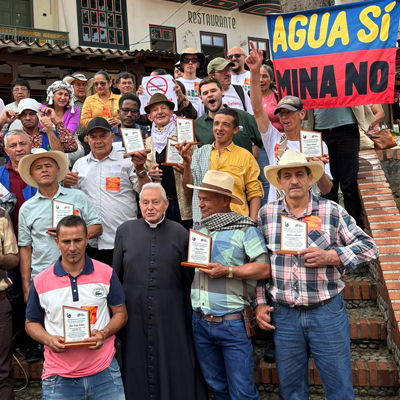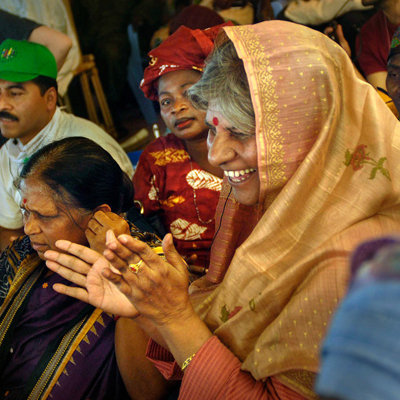Opportunities and challenges ahead of 28th round of UN climate talks
Concerns about "false solutions": "They don't result in actual emission reductions."
 Radio Mundo Real.
Radio Mundo Real.
The upcoming United Nations Conference of the Parties on Climate Change, COP 28, has been controversial from the outset: the United Arab Emirates (UAE), one of the world’s largest oil producers, is designated as host country, and Sultan Ahmed al Jaber, CEO of the state-owned Abu Dhabi National Oil Company (ADNOC), as president of the global event.
In addition, the COP faces the immense challenge of achieving a global consensus on actions to limit climate change, in the same year that scientists confirmed unprecedented levels of human-made global warming. One key debate will be on how to achieve the urgent phase-out of fossil fuels and transition to clean energy.
For Friends of the Earth International (FoEI), the world’s largest grassroots environmental federation, fossil fuel phase-out is urgent, but it must be done in a way that is just, equitable and complete. One of the biggest concerns ahead of COP28 is the large number of “false solutions” on the negotiating table, which risk distracting from real climate action.
To find out more, we interviewed Lise Masson, advocacy officer for the Climate justice and energy programme at FoEI.
—
FoEI has been calling for climate justice at the UN climate summits for many years. As you prepare for the COP28 in Dubai, which is going to be from November 30th until December 12th, what are your main concerns this year?
Obviously this year COP feels a little bit different because it’s held in Dubai, in the UAE. There has been a lot of uproar about a COP being held in a petrostate and presided over by an oil executive.
And there should be, because it is an outrageous conflict of interest, but I think it also has to be put back into the context of the history of COPs. COPs have been captured by corporations for decades. Last year at COP27, we had over 600 fossil fuel lobbyists attending. That’s more than any country delegation.
So, it’s not news that the UNFCCC is captured by fossil fuel interests, and we see the results of that corporate capture in the complete lack of ambition in the outcomes of COPs in the past decades that they’ve been running. It’s because it is those fossil fuel interests that are blocking progress and also pushing false solutions in the text, in the negotiations.
You are mentioning “false solutions”. What do you mean by that? What is it?
So by “false solutions” or sometimes “false climate solutions”, what we mean is a whole range of different processes and so-called solutions that are offered as a kind of magical fix to the climate crisis by Big Polluters. So, it’s carbon markets and offsets and removals that are being offered under the smokescreen of ‘Net Zero’.
It takes the form of so-called ‘Nature-based solutions’, like tree-planting or soil carbon. It also takes the form of Geoengineering with processes like Carbon Capture and Storage (CCS). So it’s a whole range of different things, but we can use usually recognise them because there’s a set of characteristics that all these things have in common.
The first one is quite simple: they simply do not work. That means they don’t result in actual emission reductions. Earlier this year, The Guardian newspaper had a whole investigation about a carbon certifier named Verra, that uncovered that those offsets didn’t work. But that’s just one of many, many examples that are showing us that these false solutions don’t work.
The second characteristic is that they act as a distraction from the real emission reductions that we so direly need. Big Polluters have found in these false solutions a kind of smokescreen, so that can they can keep on fuelling climate chaos. It’s basically greenwashing.
The third characteristic is that we’re seeing that everywhere those false solutions come up, they come with a range of harm on our communities and on ecosystems. There is mounting evidence of offset projects resulting in land grabbing, violations of human rights, and indigenous rights. And that’s happening first and foremost in the global South.
Why is it a special concern for FoEI in this COP? What do you expect to happen at COP28 regarding the false solutions?
So if we look at COP28 from the perspective of false solutions, we see two main battlegrounds. The first one is in the cover text itself. (The cover text, or cover decision, is a key document agreed by all countries at the end of the talks, which has legal force in the context of the Paris Agreement, the COP21 treaty which established the 1.5°C global warming limit.) We’re expecting a big push to get fossil fuel phase-out named in the cover text. But the problem is that it could be emptied of all meaning and force if it’s called “unabated”, if the word “unabated” makes its way in.
Basically, if we’re talking about phase-out of “unabated fossil fuels”, what we’re saying is that fossil fuels can stay if they’re coupled with ludicrous technofixes like Carbon Capture and Storage. However, we can’t open the door to these false solutions whilst we empty any mention of “fossil fuel phase-out” of all meaning in the text. That’s why we as a federation are calling for a rapid, just and equitable phase-out of all fossil fuels.
The second battleground in terms of false solutions for this COP is Article 6. It’s being discussed again at this COP, and this is where the UNFCCC would open the floodgates of carbon markets, offsets and removals, because it would be fully operationalising the carbon market mechanism that was agreed at COP27 in Glasgow under Article 6. That means that what’s at risk at this COP is that we would enable these incredibly harmful false climate solutions to be given a UN stamp of approval, and for Big Polluters and rich countries to keep on polluting.
So, again, as a federation what we’re saying is that we’re strongly opposing any more ground to be given to carbon markets, offsets and removals under the UNFCCC. In that really important point, we oppose any attempt to push carbon markets in place of the adequate climate finance that is needed from rich countries to fund the just transition, the Adaptation Fund, and the Loss and Damage Fund.
The just transition, the Adaptation Fund, the Loss and Damage Fund have been in the last COPs and, for many years already, very important points for FoEI in these negotiations, and I understand these worries about the false solutions. But then the public and the audience in general would ask themselves then “ok but, which are the real solutions?”, or “what are the solutions to the climate crisis that FOEI is asking for?”
Just to come back on what you were saying about climate finance, it’s exactly that, the question of the finance for the just transition, the Adaptation Fund, and the Loss and Damage Fund have been on the agenda for so long. We’re seeing a continuous failure to meet the demands for that adequate climate finance, and that’s why we’re seeing this pivoting towards using carbon markets as climate finance. That’s disastrous and it can’t happen.
In terms of the kind of wider real solutions and what those look like — because we keep saying we don’t want these false solutions, but what are those real solutions? — for us at FoEI, real solutions are the solutions that centre people. So, that means it’s Real Zero emissions, with historical emitters taking the lead in line with fair shares and principles of equity.
That means that those who are most responsible for the climate crisis happening, are the ones who need to take the boldest, most ambitious, most drastic action.
It is also about system change and justice for all those who have been on the frontline of systems of oppression, because climate justice is not just about climate. Climate justice means gender justice, it means social justice, it means economic justice and it means racial justice. So, this is what real solutions look like for us, it’s about system change.
Ok Lise, is there anything else you would like to say before we end the interview?
Maybe just to say that I think we’re seeing in the movement a bit of disillusion around COP as a process, and a lot of people want to give up on it. That’s understandable, because it’s not been delivering the action that we need, but at the same time we can’t give up on the process because we can’t give up on climate justice.
For me COP is a space that is filled with despair in some ways, but is also a space that gives me hope, because it is a space where we’re seeing the climate justice movement globally, in all its diversity, gather and organise together. There’s a lot of power in that, because it’s when we come together as a united and diverse movement that we have most power. So, we shouldn’t give up hope there.






